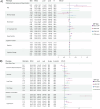Methylation risk score of C-reactive protein associates sleep health with related health outcomes
- PMID: 40437222
- PMCID: PMC12119824
- DOI: 10.1038/s42003-025-08226-1
Methylation risk score of C-reactive protein associates sleep health with related health outcomes
Abstract
C-reactive protein (CRP) reflects inflammation status and is linked to poor sleep, metabolic and cardiovascular health. Methylation (MRS) and polygenic risk scores (PRS) reflect long-term systemic inflammation, and genetically-determined CRP, respectively. To refine understanding of inflammation-linked sleep and health outcomes, we construct PRS-CRPs using GWAS summary statistics and a previously-developed MRS-CRP in the Hispanic Community Health Study/Study of Latinos. Via survey-weighted linear regression, we estimate associations between blood-, PRS-, and MRS-CRP, with multiple sleep and health outcomes (n = 2217). MRS-CRP and PRS-CRPs are associated with increasing blood-CRP level by 43% and 23% per standard deviation. MRS-CRP is associated with obstructive sleep apnea (OSA) traits, long sleep duration, diabetes and hypertension, while PRS-CRPs were not. Blood-CRP level is associated with sleep duration and diabetes. Adjusting for MRS-CRP weakens OSA-diabetes/hypertension associations. Consequently, MRS-CRP is a stronger marker than blood-CRP and PRS-CRP to systemic inflammation associated with poor sleep and related comorbidities.
© 2025. The Author(s).
Conflict of interest statement
Competing interests: The author declare no competing of interests. Ethics statement: H.C.H.S./S.O.L.: This study was approved by the institutional review boards (IRBs) at each field center, where all participants gave written informed consent, and by the Non-Biomedical IRB at the University of North Carolina at Chapel Hill, to the HCHS/SOL Data Coordinating Center. All IRBs approving the study are: Non-Biomedical IRB at the University of North Carolina at Chapel Hill. Chapel Hill, NC; Einstein IRB at the Albert Einstein College of Medicine of Yeshiva University. Bronx, NY; IRB at Office for the Protection of Research Subjects (OPRS), University of Illinois at Chicago. Chicago, IL; Human Subject Research Office, University of Miami. Miami, FL; Institutional Review Board of San Diego State University. San Diego, CA. MESA: All MESA participants provided written informed consent, and the study was approved by the Institutional Review Boards at The Lundquist Institute (formerly Los Angeles BioMedical Research Institute) at Harbor-UCLA Medical Center, University of Washington, Wake Forest School of Medicine, Northwestern University, University of Minnesota, Columbia University, and Johns Hopkins University. This work was approved by the Beth Israel Deaconess Medical Center Committee on Clinical Investigators (protocol #2023P000538).
Figures



Update of
-
Analysis of C-reactive protein omics-measures associates methylation risk score with sleep health and related health outcomes.medRxiv [Preprint]. 2024 Sep 4:2024.09.04.24313008. doi: 10.1101/2024.09.04.24313008. medRxiv. 2024. Update in: Commun Biol. 2025 May 28;8(1):821. doi: 10.1038/s42003-025-08226-1. PMID: 39281736 Free PMC article. Updated. Preprint.
References
-
- Pataka, A. & Riha, R. L. The obstructive sleep apnoea/hypopnoea syndrome - An overview. Respir. Med CME2, 111–117 (2009).
-
- Colla-Machado, P. E. et al. Prevalence of silent cerebrovascular lesions in patients with obstructive sleep apnea syndrome. Rev. Neurol.62, 113–117 (2016). - PubMed
-
- Meier-Ewert, H. K. et al. Effect of sleep loss on C-Reactive protein, an inflammatory marker of cardiovascular risk. J. Am. Coll. Cardiol.43, 678–683 (2004). - PubMed
MeSH terms
Substances
Grants and funding
- UL1 RR033176/RR/NCRR NIH HHS/United States
- HHSN268201500003C/HL/NHLBI NIH HHS/United States
- N01 HC095161/HL/NHLBI NIH HHS/United States
- U54 HG003067/HG/NHGRI NIH HHS/United States
- N01 HC065236/HL/NHLBI NIH HHS/United States
- N01 HC065235/HL/NHLBI NIH HHS/United States
- U01 HL120393/HL/NHLBI NIH HHS/United States
- R01 HL071250/HL/NHLBI NIH HHS/United States
- N01 HC095167/HL/NHLBI NIH HHS/United States
- R01 HL161012/HL/NHLBI NIH HHS/United States
- R01 AG080598/AG/NIA NIH HHS/United States
- HHSN268201800001C/HL/NHLBI NIH HHS/United States
- R01HL161012/U.S. Department of Health & Human Services | NIH | National Heart, Lung, and Blood Institute (NHLBI)
- UL1 TR001420/TR/NCATS NIH HHS/United States
- N01 HC095163/HL/NHLBI NIH HHS/United States
- R01 HL071205/HL/NHLBI NIH HHS/United States
- UL1 TR000040/TR/NCATS NIH HHS/United States
- N01 HC095166/HL/NHLBI NIH HHS/United States
- N01 HC095160/HL/NHLBI NIH HHS/United States
- N01 HC095168/HL/NHLBI NIH HHS/United States
- R01 HL071251/HL/NHLBI NIH HHS/United States
- R01 HL071259/HL/NHLBI NIH HHS/United States
- HHSN268201300003I/HL/NHLBI NIH HHS/United States
- R01 AG048642/AG/NIA NIH HHS/United States
- RF1 AG061022/AG/NIA NIH HHS/United States
- UL1 TR001079/TR/NCATS NIH HHS/United States
- N01 HC095169/HL/NHLBI NIH HHS/United States
- N01 HC065233/HL/NHLBI NIH HHS/United States
- R56 AG048642/AG/NIA NIH HHS/United States
- N01 HC095159/HL/NHLBI NIH HHS/United States
- N01 HC065234/HL/NHLBI NIH HHS/United States
- P30 DK063491/DK/NIDDK NIH HHS/United States
- R01 HL071051/HL/NHLBI NIH HHS/United States
- HHSN268201300003C/HG/NHGRI NIH HHS/United States
- R01 AG075758/AG/NIA NIH HHS/United States
- HHSN268201500014C/HL/NHLBI NIH HHS/United States
- HHSN268201500003I/HL/NHLBI NIH HHS/United States
- R01 HL117626/HL/NHLBI NIH HHS/United States
- N01 HC095162/HL/NHLBI NIH HHS/United States
- UL1 TR001881/TR/NCATS NIH HHS/United States
- N01 HC095165/HL/NHLBI NIH HHS/United States
- N01 HC095164/HL/NHLBI NIH HHS/United States
- N01 HC065237/HL/NHLBI NIH HHS/United States
- R01 HL071258/HL/NHLBI NIH HHS/United States
LinkOut - more resources
Full Text Sources
Research Materials
Miscellaneous

